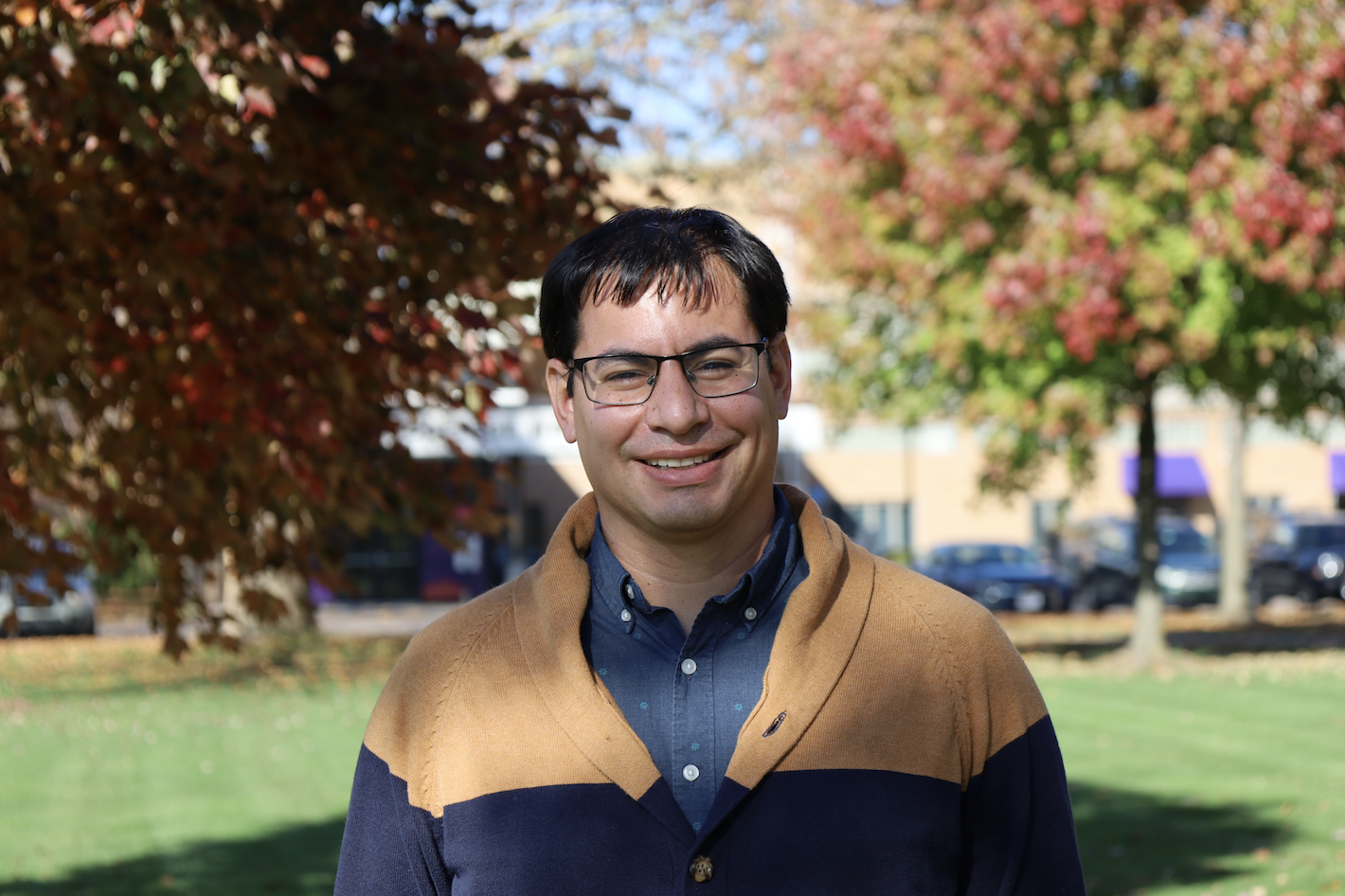Nata Fontan did not always want to be a therapist, peeking into people’s lives. Now, as he fields a series of probing questions, those roles seem to be reversed.
“Since I was young, my dream was to be a college professor,” he said, leaning back in a squeaky chair, fingers entwined.Fontan is in his office on the first floor of Wyse 118, pausing for an interview between counseling sessions with Goshen College students.
In 2018, he graduated from GC with a bachelor’s degree in social work, but his story begins thousands of miles south. Fontan grew up in Argentina and attended a Mennonite seminary in Paraguay.
After graduation, he came to the United States in 2011.
“I decided my seminary degree was great, but if I wanted to continue working in mental health and learn more skills, I needed a different background than theology,” Fontan said.
He accomplished that goal with his social work degree, later earning a master’s in that discipline at Boise State University.
Fontan, 34, has been at GC for two years, spending eight hours on campus each week. He also works with adults at Oaklawn Community Center, where he teaches and leads group sessions.
“One is called Wellness Self-Management Plus, which is a psychoeducational program that addresses mental illness and substance use,” Fontan said. “The other is called … Cognitive Behavioral Therapy … for individuals with depression.”
Liz Andes oversees the campus counseling program and has worked with Fontan for a year.
“Nata is incredibly warm and gentle,” Andes said. “He puts people at ease and makes them feel [welcome].”
The most rewarding aspect of Fontan’s job is to “hear people talk about their lives, how they open up about the things that happen to them – both positive and negative.”
Being a therapist of color is also important to Fontan as he creates a space for cross-cultural communication.
“When you can’t address something related to mental health in your language, it can create a huge barrier,” he said.
In a counseling satisfaction survey, many students wrote that Fontan helped them understand family dynamics and cultivated an appreciation for being able to speak Spanish.
“Being bilingual … has allowed Nata to connect on a deeper level with some of our … students,” Andes said.
When asked about the challenges of his job, Fontan leaned forward in a gesture of passion mingled with frustration.
“Barriers,” he said. “People come to [me] with so many barriers that are beyond their control.”
These include housing, transportation and systemic obstacles like healthcare access, Fontan noted.
He explained the importance of advocacy, “especially in a state where — from a social work perspective — many things need to be changed.”
The biggest challenges Fontan has noticed are fair funding for mental health services and research-based programs.
“[Because of] inadequate funding, agencies are not able to … [hire] or retain experienced providers and are constantly understaffed,” he said. “This keeps providers from being able to meet client needs and from acquiring needed professional growth and expertise.”
Regarding research-based program funding, Fontan cited Indiana’s punitive approach to substance treatment, which “reflects the traditional federal efforts of the so-called War on Drugs.”
“Whereas coordination and collaboration between the justice system and mental health services [are] certainly appropriate, the underpinnings of treatment need to be based on research,” he added.
Therapists are also sometimes thrust into gut-wrenching situations as authorities investigate the neglected parts of society.
Fontan said he would never forget the cases he worked on as a forensic translator for Spanish-speaking families in Indiana.
“It’s a very delicate field – children being interviewed for abuse,” he recalled. “It was … traumatic.”
These cases, he said, cemented his passion for social work, leading him to dedicate his professional life to fostering a safe environment for families.
“At some point … I definitely burnt out,” he said. “That taught me to be more proactive.”
Fontan now has resources available like connecting with others in the field and practicing self-care in “some form or the other every day.”
To escape the demands of his job, he raises a French breed of rabbits — Argente Creme — which he has done for four years.
“It was a way to reconnect with my childhood,” he said. “I grew up raising animals in Argentina.”
Fontan recalled his experience immigrating to a new country, noting how everything was exciting but “it gets to a point where you start missing [home].
“That happened to me a few years ago, and… I [needed] to get back to the things I [enjoyed]. Raising animals was one of them.”
Fontan thinks his two children, Willow and Francesco, might also adopt the hobby.
“They love handling the rabbits, especially when they’re young — smaller and cuter,” he said with a laugh, his face lighting up as he talked about family.
Fontan’s door is always open for students to say “hi” and drink mate — a caffeinated South American beverage.
He hopes to “be accessible for everyone” because “that’s the part of mental health we still have to work on.”
“People can just come to talk and not wait until something [builds up],” Fontan said. “Even if it’s [only] five minutes.”
As for his hopes of becoming a college professor?
Although Fontan loves his current job, he still thinks of teaching.
“I … like facilitating debate and encouraging others to question ‘absolute truths’ … the college level has a lot of that.”
“It’s still an aspiration,” he said.




